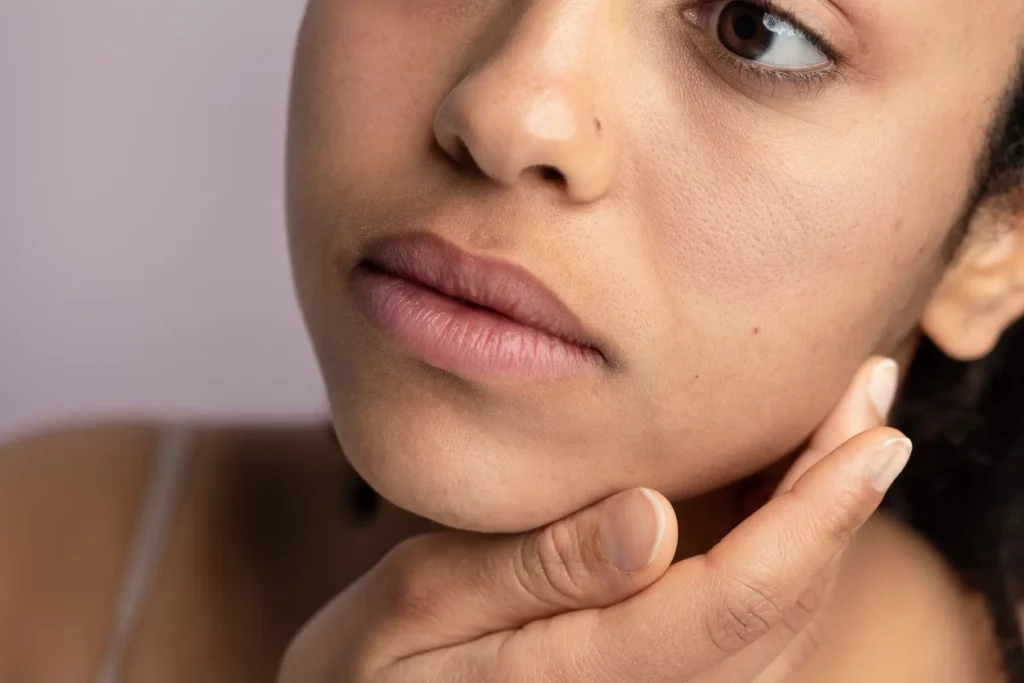Wondering how to know your skin type? Here’s a guide to different skin types to help you build an effective skincare routine.
Are you struggling to achieve your skin goals despite having a multi-step skincare routine in place? You might need to rebuild your skincare regimen based on your skin type. But how to know your skin type, and why is it so important? Knowing your skin type is the first and most important step toward finding the skincare products that deliver the best results. Because the one-size-fits-all approach does not apply to skincare, I have put together a comprehensive guide on how to know your skin type, the unique characteristics of each type, and what kind of skincare products are best suited for each one.
What are the different skin types?
There are many different types of skin, each with distinctive characteristics. These skin types include dry, combination, sensitive, and oily. Here’s how to know your skin type:
Oily skin
Your face will appear shiny if you have oily skin, especially in the T-zone (forehead, nose, and chin). Oily skin is known to have a coarse texture and a lot of comedones or plugged open pores. You might have large, noticeable pores and also be prone to acne breakouts a due to overproduction of the sebaceous (oil-producing) glands, especially throughout adolescence. There is some good news as well. People with oily skin age slowly compared to other skin types because the oils keep the skin soft and supple. So, you are less prone to developing wrinkles and lines at an early age. To keep your oily skin healthy, I recommend using oil-free and non-comedogenic products that won’t clog your pores.
Dry skin

Tightness and flakiness, especially after washing your face, are clear signs of dry skin. You are also more susceptible to redness and itching if you have dry skin. Due to the lack of sebum and natural oils, dry skin is more prone to sensitivity and irritation. While you may not have to deal with the excess oil on your face every day, dry skin ages more rapidly, develop fine lines and wrinkles early, and lack of moisture causes several skin-related problems, all of which could make you look older than you are. So, it is best to avoid harsh products with salicylic acid, tea tree oil, or alcohol if you have dry skin, as these strip off the natural oils in your skin. Instead, opt for moisturising products that contain hydrating ingredients like hyaluronic acid to get a healthy, luminous complexion.
Combination skin

Combination skin is a mix of oily and dry skin. If you have combination skin, your T-zone is oily while the rest of your face is normal or dry. This skin type is characterised by medium pores, an even and smooth texture, good blood flow, and a healthy colour. The need to use different products on various parts of your face makes maintaining combination skin difficult. It is a good idea to stick to water-based products if you have this skin type. I recommend using gentle, non-drying cleansers and moisturisers that won’t strip your skin of its natural oils.
Sensitive skin

You might experience redness, itching, and stinging after using certain skincare products if you have sensitive skin. Skin sensitivity results from a breakdown in the skin’s barrier. So, people with this skin type are particularly sensitive to a range of stimuli, including heat and sunlight. To keep your sensitive skin healthy, I recommend using fragrance-free and hypoallergenic products that are gentle on the skin.
If you are still unsure about your skin type, book a consultation with Dr Geetika here to know more about your skin and how to take care of it properly.